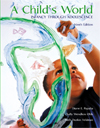Diane E. Papalia,
University of Wisconsin-Madison
Sally Wendkos Olds
Ruth Duskin Feldman
| animism | tendency to attribute life to objects that are not alive
|
 |
 |
 |
| autobiographical memory | memory of specific events in one's own life.
|
 |
 |
 |
| centration | In Piaget's theory, tendency of preoperational children to focus on one aspect of a situation and neglect others.
|
 |
 |
 |
| conservation | Piaget's term for awareness that two objects that are equal according to ac certain measure remain equal in the face of perceptual alteration so long as nothing has been added to or taken away from either object.
|
 |
 |
 |
| decenter | In Piaget's terminology, to think simultaneously about several aspects of a situation.
|
 |
 |
 |
| dual representation hypothesis | proposal that children under the age of 3 have difficulty grasping spatial relationships because of the need to keep more than one mental representation in mind at the same time.
|
 |
 |
 |
| egocentrism | Piaget's term for inability to consider another person's point of view.
|
 |
 |
 |
| emergent literacy | preschoolers' development of skills, knowledge, and attitudes that underlie reading and writing.
|
 |
 |
 |
| empathy | ability to put oneself in another person's place and feel what that person feels.
|
 |
 |
 |
| episodic memory | long-term memory of specific experiences or events, linked to time and place.
|
 |
 |
 |
| fast mapping | process by which a child absorbs the meaning of a new word after hearing it once or twice in conversation.
|
 |
 |
 |
| generic memory | memory that produces scripts of familiar routines to guide behavior.
|
 |
 |
 |
| irreversibility | Piaget's term for a preoperational child's failure to understand that an operation can go in two or more directions.
|
 |
 |
 |
| pragmatics | the practical knowledge needed to use language for communicative purposes.
|
 |
 |
 |
| preoperational stage | In Piaget's theory, the second major stage of cognitive development (approximately from age 2 to age 7), in which children become more sophisticated in their use of symbolic thought but are not yet able to use logic.
|
 |
 |
 |
| private speech | talking aloud to oneself with no intent to communicate.
|
 |
 |
 |
| recall | ability to reproduce material from memory.
|
 |
 |
 |
| recognition | ability to recognize a previously encountered stimulus.
|
 |
 |
 |
| script | general remembered outline of a familiar, repeated event, used to guide behavior.
|
 |
 |
 |
| social cognition | ability to understand that others have mental states and to judge their feelings and intentions.
|
 |
 |
 |
| social interaction model | model, based on Vygotsky's sociocultural theory, which proposes that children construct autobiographical memories through conversation with adults about shared events.
|
 |
 |
 |
| social speech | speech intended to be understood by a listener.
|
 |
 |
 |
| Stanford-Binet Intelligence Scale | individual intelligence test used to measure memory, spatial orientation, and practical judgment.
|
 |
 |
 |
| symbolic function | In Piaget's terminology, ability to use mental representations (words, numbers, or images) to which a child has attached meaning.
|
 |
 |
 |
| theory of mind | awareness and understanding of mental processes.
|
 |
 |
 |
| transduction | Piaget's term for a preoperational child's tendency to mentally link particular experiences, whether or not there is logically a causal relationship.
|
 |
 |
 |
| Wechsler Preschool and Primary Scale of Intelligence, Revised (WPPSI-R) | individual intelligence test for children ages 3 to 7, which yields verbal and performance scores as well as a combined score.
|



 2002 McGraw-Hill Higher Education
2002 McGraw-Hill Higher Education